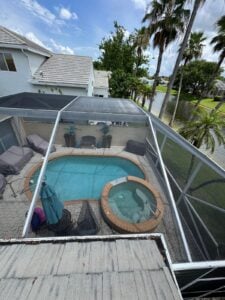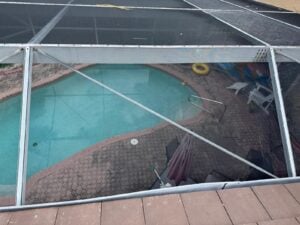Call: (877) 690-0072
Patios are a Florida staple—perfect for lounging, entertaining, or simply enjoying a bug-free evening outdoors. But over time, even the best patio screens can break down. Whether you’re dealing with tears, sagging mesh, or rusted frames, recognizing when it’s time for a patio screen repair or full replacement can save you both money and frustration.
So how do you know when to call in the pros? Let’s walk through the top signs your screen is due for an upgrade—and what you can expect it to cost.
A small tear may seem harmless, but in Florida, where mosquitoes and other pests thrive, even the tiniest gap is an open invitation. At first, patching might be enough. But if you’re repeatedly fixing the same area or discovering new holes every few weeks, it’s a clear sign your screen mesh is weakening and needs to be replaced altogether.
Tight screens don’t just look better—they function better. Over time, the mesh may sag from age, weather exposure, or improper installation. This creates gaps along the edges where bugs and debris slip through. Sagging screens are more than a nuisance—they’re an indicator that your enclosure is no longer doing its job.
If your mesh doesn’t bounce back or feels loose to the touch, it’s time to schedule a replacement. A professional will not only fix the mesh but also reinforce the structure to ensure it lasts.
Florida’s salty air and humid climate wreak havoc on metal frames. If your patio screen’s frame is starting to show rust or is visibly bent, it’s not just about looks—it’s a safety and stability issue. A corroded frame can’t properly support the screen mesh and will continue to degrade, possibly compromising your entire enclosure.
At this stage, you’re likely beyond a simple repair. You’ll need a full replacement or a major overhaul, especially if your screen is part of a lanai or pool enclosure.
Living in Florida, you know mold and mildew come with the territory. But once it takes root in your patio screen, it’s hard to eliminate. Beyond being unsightly, mold poses health risks, especially for allergy-prone family members.
If cleaning your screen no longer restores its appearance—or the mildew smell lingers—it’s likely time to replace the mesh altogether. Modern screen materials are mildew-resistant and easier to maintain.
Sometimes, you’ll notice daylight coming through where it shouldn’t. Misaligned panels or gaps in the enclosure can result from settling, age, or poor installation. These gaps not only ruin the aesthetics of your patio, but also create easy entry points for pests, rain, and debris.
In Florida, most screened patios need to comply with specific building codes to withstand storms and wind loads. And yes—a permit is typically required to screen in your patio, especially if you’re installing a new structure or modifying the enclosure. Local municipalities often require engineer-approved plans.
So if you’re noticing gaps or major misalignments, a licensed contractor is your best bet for a compliant, durable solution.
The Florida sun is no joke. After years of UV exposure, screen mesh can become faded, brittle, and dusty. If touching your screen leaves a residue or it tears at the slightest pressure, you’re dealing with UV damage. Time to replace it.
Newer screens are UV-resistant and offer options like pet-proof or solar screen mesh, which can improve durability and energy efficiency.

Have you noticed a thin white line running across your screen? This is often a sign of sun-induced heat damage. Prolonged UV exposure can weaken the connection between the mesh and the frame, especially in older patio enclosures. These white lines often appear where the screen meets the frame and may lead to tearing or detachment over time.
This visual cue is more than cosmetic—it’s an early indicator that your screen has structural fatigue and may soon rip. If you see white lines forming, it’s a good idea to plan for a replacement before further damage occurs.

If you’ve been patching here and there for years, it may be time to ask yourself: “Would a full replacement actually cost less in the long run?” The answer is probably yes.
For example, rescreening a lanai depends on square footage and material. But if the frame or roof is compromised, a new structure may be necessary. Full screened patios may even reach $15,000 or more, especially when high-grade aluminum or custom enclosures are involved.
If you’re dealing with torn screens, sagging mesh, or planning a full enclosure upgrade, PatioScreenPro stands out as the trusted name in patio screen repair throughout Broward and Palm Beach counties.
They don’t just promise quality—they deliver it, backed by a strong record of success:
1,500+ Happy Customers — Proven satisfaction from homeowners across South Florida
100% Service Guarantee — They stand behind every project, large or small
15+ Skilled Professionals — A dedicated, licensed, and insured team
1,000+ Services Completed — From single screen repairs to full patio enclosures
But the numbers are just the beginning. Here’s what sets them apart:
Whether you’re replacing a patio door screen, rescreening a lanai, or designing a new outdoor enclosure, PatioScreenPro combines experience, craftsmanship, and affordability to get the job done right.
Your patio screen protects your home, adds value, and helps you enjoy Florida living at its best. Don’t let small issues become big, expensive problems. If you notice any of the signs above, it’s time to call the professionals for a quote. Patio screen repair might be a small investment now, but it pays off in comfort, safety, and peace of mind for years to come.
Don’t wait until a small tear becomes a major repair. Let the pros handle your next patio screen repair with professionalism and precision.
👉 Explore their full list of services here:
https://patioscreenpro.com/services/
#PatioScreenRepair
#BocaRatonOutdoorLiving
#PembrokeScreenReplacement
#FloridaLanaiRepair
#MosquitoFreePatio
#RescreeningExperts
#PatioScreenPro
#UVDamageScreenFix
#LicensedFloridaContractors
#SouthFloridaScreenEnclosures